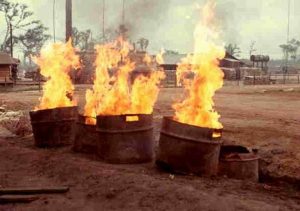 Personal Hygiene. The convenience of running water is a luxury that few of us have had to go without for any period of time. Without flowing water and flushing toilets, bathing and using the bathroom becomes an inconvenient chore. You can be sure that with the outage of electrical power, the pumps that push water into our sinks, tubs and toilets will stop flowing. An outdoorsman, I’ve spent many weeks at a time camping, hiking and hunting, but never appreciated how difficult this could be until deploying with the 18th Airborne Corps during Operation Desert Storm. Our Army, untested in desert battle since WWII, was trained in field hygiene, but failed to take many basic precautions because they weren’t convenient. We had the “book learning” and had passed the written tests, but had never truly practiced what we learned. First, bathing habits suffered and everyone started to smell pretty ripe. Some even conserved water by not brushing their teeth. Uniforms couldn’t be washed, so dirt and sand caked up on them, held in place by sweat and body oils. Hands and skin got grimy and there was nowhere to wash aside from using bottled water, which was tightly rationed. Eating utensils went unwashed. We tried digging toilet trenches inside of our perimeter, but the sand quickly collapsed. A few guys even fell into the exposed trenches while patrolling at night. We started using ½ barrels to collect our excretions but they attracted millions of black flies and developed an indescribable smell. When the barrels got ¾ full, we topped them off with diesel and lit them on fire, the sweet smelling black smoke often blowing back over our fire base. Sand fleas ate us up, despite the application of DEET, an oil-based insect repellent that attracted sand. The Army finally issued “uniform impregnation kits”, a strong-smelling concentration of permethrin that worked pretty good but caused skin rashes. Within the first month the numbers of crotch rash and athlete’s foot cases skyrocketed. Untreated cuts quickly became infected, seeping messes. Oral hygiene suffered and the number of dental emergencies went up despite extensive pre-deployment dental checks.
Personal Hygiene. The convenience of running water is a luxury that few of us have had to go without for any period of time. Without flowing water and flushing toilets, bathing and using the bathroom becomes an inconvenient chore. You can be sure that with the outage of electrical power, the pumps that push water into our sinks, tubs and toilets will stop flowing. An outdoorsman, I’ve spent many weeks at a time camping, hiking and hunting, but never appreciated how difficult this could be until deploying with the 18th Airborne Corps during Operation Desert Storm. Our Army, untested in desert battle since WWII, was trained in field hygiene, but failed to take many basic precautions because they weren’t convenient. We had the “book learning” and had passed the written tests, but had never truly practiced what we learned. First, bathing habits suffered and everyone started to smell pretty ripe. Some even conserved water by not brushing their teeth. Uniforms couldn’t be washed, so dirt and sand caked up on them, held in place by sweat and body oils. Hands and skin got grimy and there was nowhere to wash aside from using bottled water, which was tightly rationed. Eating utensils went unwashed. We tried digging toilet trenches inside of our perimeter, but the sand quickly collapsed. A few guys even fell into the exposed trenches while patrolling at night. We started using ½ barrels to collect our excretions but they attracted millions of black flies and developed an indescribable smell. When the barrels got ¾ full, we topped them off with diesel and lit them on fire, the sweet smelling black smoke often blowing back over our fire base. Sand fleas ate us up, despite the application of DEET, an oil-based insect repellent that attracted sand. The Army finally issued “uniform impregnation kits”, a strong-smelling concentration of permethrin that worked pretty good but caused skin rashes. Within the first month the numbers of crotch rash and athlete’s foot cases skyrocketed. Untreated cuts quickly became infected, seeping messes. Oral hygiene suffered and the number of dental emergencies went up despite extensive pre-deployment dental checks.
These were soldiers, men trained extensively in field hygiene. Yet, after only a month these previously healthy young men experienced hygiene problems not seen since their grandfathers fought in WWII 50 years earlier.
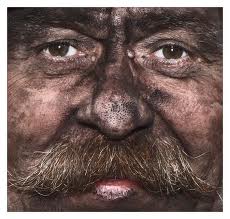 Now, when faced with a failed water supply, try to imagine how the middle-aged and untrained people in your neighborhood will be affected. Not good, I can assure you. Still, there are things you can do to avoid the spread of disease and reduce the spread of germs and disease, even without running water.
Now, when faced with a failed water supply, try to imagine how the middle-aged and untrained people in your neighborhood will be affected. Not good, I can assure you. Still, there are things you can do to avoid the spread of disease and reduce the spread of germs and disease, even without running water.
Body Waste. The thing to discourage about body waste disposal are random “cat holes”, spread nilly-willy all over the place. People are lazy, and when tired will do their business only a few steps outside their door, especially if the weather is bad. They’ll piss into bottles, in corners, against buildings, and even into non-functioning toilets until they overflow. I’ve seen people pooping under building eaves, in unused rooms, and even in abandoned vehicles. This really isn’t rocket science. First, establish an outdoor “bathroom” area well away from your living space and water supplies. Second, dig a DEEP, LONG trench and pile the dirt right next to it. The deeper and longer, the better so you don’t have to dig another one anytime soon. Third, hang a privacy tarp around the trench. That’s it. After using the trench, use a couple of shovelfuls of dirt to cover the pile so it doesn’t stink or draw flies. The final step is hand cleaning, so we don’t get an epidemic of hepatitis A started. When the trench is full, dig another one alongside and mark the old one so you don’t accidentally dig back into it later.
PLEASE don’t be tempted to continue using your bathroom toilets after the commercial water supply fails. Even if you carry in water to wash down the waste, the sewer pipes from your house to the street will eventually become clogged from lack of use and you’ll have a serious indoor sanitation problem. Stop using your toilets as soon as the water supply stops flowing. Your toilets have a small amount of water in the bowl to prevent sewer gas from seeping back into your house and you’ll need to occasionally replenish it as it evaporates. Cover your toilet bowl with plastic wrap to minimize the evaporation and turn off the water supply to the bowl. Make sure everyone understands that the toilet cannot be used under ANY circumstances.
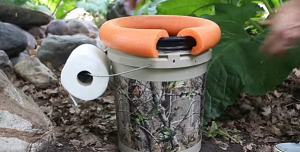 Makeshift Toilets. Not everyone likes to go outside in the middle of the night or during inclement weather so we need to make some provisions for that. A 5-gallon bucket makes an excellent temporary toilet. You can sit right on the rim, or place a real toilet seat on top for comfort. When not in use, keep the lid on it to minimize insects and smell. During daylight or when the inclement weather abates, dump it into your latrine trench and rinse out the bucket for reuse. Our ancestors did it with bedpans, we can do it with buckets.
Makeshift Toilets. Not everyone likes to go outside in the middle of the night or during inclement weather so we need to make some provisions for that. A 5-gallon bucket makes an excellent temporary toilet. You can sit right on the rim, or place a real toilet seat on top for comfort. When not in use, keep the lid on it to minimize insects and smell. During daylight or when the inclement weather abates, dump it into your latrine trench and rinse out the bucket for reuse. Our ancestors did it with bedpans, we can do it with buckets.
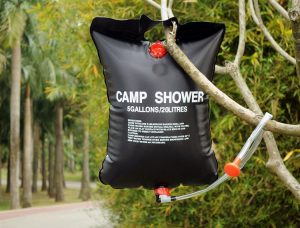 Camp Showers. In decent weather you can simply bathe outside using a “camp shower” ($15 on Amazon). It consists of a 10-gallon reservoir connected to a hose. The reservoirs are usually black to absorb sunlight and heat the water, making your outdoor shower a slightly more pleasant experience. Camp showers are easy to improvise using one of your 5-gallon buckets and a piece of garden hose. Rain water is fine for showering without purification, just try to keep it out of your mouth.
Camp Showers. In decent weather you can simply bathe outside using a “camp shower” ($15 on Amazon). It consists of a 10-gallon reservoir connected to a hose. The reservoirs are usually black to absorb sunlight and heat the water, making your outdoor shower a slightly more pleasant experience. Camp showers are easy to improvise using one of your 5-gallon buckets and a piece of garden hose. Rain water is fine for showering without purification, just try to keep it out of your mouth.
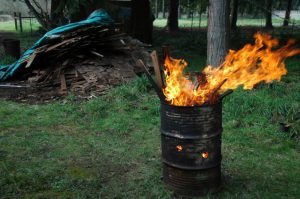 Waste Disposal. Garbage trucks may not show up for quite a while so you’ll need to dispose of your own refuse. Don’t let it pile up at the street, or be tempted to throw it into your latrine because it’ll fill it up quickly and attract pests. Instead, establish a separate area to burn your trash. Bury leftover food and organic matter deep enough so that rodents can’t get at it. Your goal is to destroy or deny access to anything that might attract insects or rodents, which all carry disease. Metal 55-gallon drums work great for burning trash if you punch a few air holes near the bottom.
Waste Disposal. Garbage trucks may not show up for quite a while so you’ll need to dispose of your own refuse. Don’t let it pile up at the street, or be tempted to throw it into your latrine because it’ll fill it up quickly and attract pests. Instead, establish a separate area to burn your trash. Bury leftover food and organic matter deep enough so that rodents can’t get at it. Your goal is to destroy or deny access to anything that might attract insects or rodents, which all carry disease. Metal 55-gallon drums work great for burning trash if you punch a few air holes near the bottom.
Feminine products. I really wouldn’t want to break the news to my wife that she has to start wadding up paper towels to substitute for tampons or sanitary napkins. These are cheap and easy to store, so do your spouse a favor and stock up on a few months’ worth as cheap insurance. Also, since we know that everyone’s hygiene will suffer, grab some non-prescription anti-itch cream (Vagisil, Vagicaine, or similar), and an anti-fungal (Monistat, Azo, Miconazole, and others). These generic anti-fungals can also be effective against athlete’s foot and jock itch.
Infant formula & diapers. Baby formula powders aren’t cheap, but they have a long shelf life. This is one thing you really can’t afford to go without and there’s really no substitute if you run out. Many babies grow accustomed to the taste of a single brand and refuse all others, so you can guess which brand will be sold out when you need it most… Store up some extra while you can. Disposable diapers are nice-to-have items but are SUPER convenient so many people consider them indispensable. They’re expensive and bulky though, making them difficult to store in large quantities. Most also contain synthetic materials that you can’t burn, leaving you with a daily (sometimes hourly) recurring disposal problem. If you throw disposable diapers into your latrine trench, it’ll fill up in no time, so you’ll find yourself digging a LOT of holes to get rid of the damn things. An alternative are the old school cotton diapers that are washed out and reused. Cotton diapers aren’t entirely without problems because you’ll need large quantities of water, soap, and a clothesline. Unless you want to start a Hepatitus A epidemic, please DON’T wash them out in lakes, rivers or creeks because others may unknowingly use them as a drinking water source.
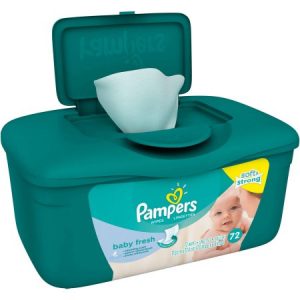 Baby wipes. I once kept clean for four months using only baby wipes and bottled water. No, it wasn’t by choice, but while on a military deployment to Afghanistan. Admittedly, I never truly felt totally clean, but at least I didn’t smell too bad. More importantly, I didn’t develop skin rashes or psoriasis, nor did I develop jock itch or athlete’s foot. Bathing with baby wipes isn’t ideal, but for short periods its possible. Disposal of the towels can be a problem because they’re synthetic material, but they’re small enough that dropping them into the latrine pit doesn’t fill it up too fast.
Baby wipes. I once kept clean for four months using only baby wipes and bottled water. No, it wasn’t by choice, but while on a military deployment to Afghanistan. Admittedly, I never truly felt totally clean, but at least I didn’t smell too bad. More importantly, I didn’t develop skin rashes or psoriasis, nor did I develop jock itch or athlete’s foot. Bathing with baby wipes isn’t ideal, but for short periods its possible. Disposal of the towels can be a problem because they’re synthetic material, but they’re small enough that dropping them into the latrine pit doesn’t fill it up too fast.
Hand gel. Alcohol-based hand gel will control the spread of germs and let you “wash” your hands after using the latrine and before meals. While not a substitute for washing your hands with soap and water, using the gel kills germs, thus reducing the chance of infection.
Soap. There’s no replacement for soap, but it’s cheap, easy to store and has an unlimited shelf life. The cheapest form is dish washing liquid because its cheap and very concentrated, meaning you won’t need more than a bottle or two to get through 30 days. You can use dish washing soap to wash your hands and body, as well as clothing.
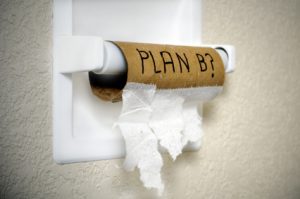 Toilet Paper. This is one of those nice-to-have things. In the field there are plenty of things you could substitute (waste paper, leaves, old rags, bundles of grass, pine cones (really!), etc.), but none are as efficient or comfortable as the real thing. Again, this is a cheap item to keep on hand if you have a place to store the bulky packages. This is the one item that if you run out of, you’ll hear about it 2-3 times per day from every person in your group. That’s a lot of complaining to endure for not buying a couple of packages of TP!
Toilet Paper. This is one of those nice-to-have things. In the field there are plenty of things you could substitute (waste paper, leaves, old rags, bundles of grass, pine cones (really!), etc.), but none are as efficient or comfortable as the real thing. Again, this is a cheap item to keep on hand if you have a place to store the bulky packages. This is the one item that if you run out of, you’ll hear about it 2-3 times per day from every person in your group. That’s a lot of complaining to endure for not buying a couple of packages of TP!